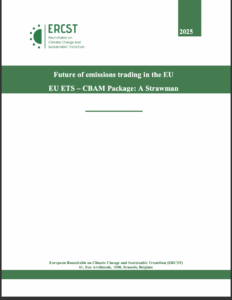
- This event has passed.
Stakeholder event “Border Carbon Adjustments in the EU: Issues and Options”

As part of the European Green Deal, implementation of a BCA is once again being considered as a measure to address competitiveness concerns within the EU. According to the roadmap for the European Green Deal, a proposal for a BCA for “selected sectors” will be released in 2021. So far, we can only speculate what such a BCA might look like, as few policy details have been released. Given the resurgence of discussions about BCAs on the EU political agenda, it is an opportune time to have a closer look at the various available policy design elements and options, along with the associated environmental, economic, political and legal implications, in order to better understand what form of BCA might work for the EU.
This meeting will be an opportunity for invited stakeholders to comment on, and contribute to, a draft paper being prepared by Andrei Marcu, Michael Mehling and Aaron Cosbey. This invitation is strictly personal.
The draft paper is intended to unpack the design elements of a BCA, develop options for each of these elements, and then analyze them based on the following five criteria:
- Effectiveness in preventing emissions leakage and spurring climate action;
- Ability to level the competitive playing field and shield European industry;
- Compatibility with international law, especially WTO law;
- Political viability and potential to disrupt diplomatic relations;
- Technical and administrative feasibility.
Some of the questions that are planned for discussion on March 5th include:
- Type of Mechanism: How should the ‘carbon border adjustment mechanism’ be implemented? Through a tax or tariff, an extension of the EU ETS, or an alternative mechanism (e.g. performance standards)? Should it only apply to imports, only to exports, or to both?
- Geographic, Sectoral and Emissions Scope: Who and what should be covered by the mechanism? All countries, or only countries that meet, or fail to meet, certain criteria (e.g. development level, minimum carbon price, participation in international climate efforts)? Basic commodities only, or also more complex manufactured goods (and in both cases, how are these selected)? Direct (Scope 1) emissions only, or also indirect (Scope 2 and 3) emissions?
- Determination of Embedded Carbon: How should the carbon intensity of products be determined? Based on sectoral/product benchmarks or averages, or based on actual (reported and verified) emissions? If averages/benchmarks are used, which? And should foreign producers be allowed to demonstrate actual emissions individually through verified emissions reports?
- Adjustment Methodology: How should the EU determine the level of the ‘carbon border adjustment mechanism’? Should it use the difference in explicit carbon price levels between the EU ETS and the foreign jurisdiction? Or the difference in effective carbon rates, taking into account other climate mitigation policies? Or should it assume e.g. a global sectoral average, allowing foreign jurisdictions to prove the carbon constraints in the relevant sector are higher than the global average?
- Use of Revenue: What purposes should revenue be used for? Should revenue collected with the ‘carbon border adjustment mechanism’ be earmarked for investments in the EU, for instance in clean innovation and infrastructure, or transition assistance to vulnerable sectors? Or should it be allocated to international climate finance, or otherwise sent outside the EU, for instance through an innovation fund?
- Scenarios/options: in developing 1-3 implementation scenarios, what should be the focus and what kind of balance would you advise between different priorities?
This will be the first stakeholder event for this ERCST project on border carbon adjustment, which is supported by Eurofer, Enel, FuelsEurope, the French government, the German government, HeidelbergCement, MetInvest, and Solvay. Other funders are examining the possibility of joining.
[rtec-registration-form]
Workshop Material(s)
Agenda
ERCST presentation
Presentation by G. Zachmann
Presentation by J. Cooper
Presentation by F. Branger
Upcoming Events
Carbon Leakage under CBAM and Free Allocation – 2nd Stakeholder Meeting
January 28 @ 14:00 - 16:00Focus Group – European Commission’s CO₂ Transport Package: Implications for EU Climate Policy
January 29 @ 15:00 - 16:30Stakeholder Consultation: EU CBAM Legislative Proposal
February 3 @ 15:00 - 16:30Debate – Industrial Accelerator Act: will it be the signal for hydrogen demand to emerge?
February 4 @ 15:00 - 17:00Carbon Leakage under CBAM and Free Allocation – Launch event
February 12 @ 10:00 - 12:00
Past Events
Stakeholder consultation- EU’s Road Transport Decarbonization Policy: Innovative Policy Approaches for Industrial Competitiveness
January 15 @ 15:00 - 16:30Focus Group: EU CBAM Legislative Proposal
January 13 @ 15:00 - 16:30Stakeholder Roundtable: 2026 State of the EU ETS Report
January 13 @ 10:00 - 12:00

